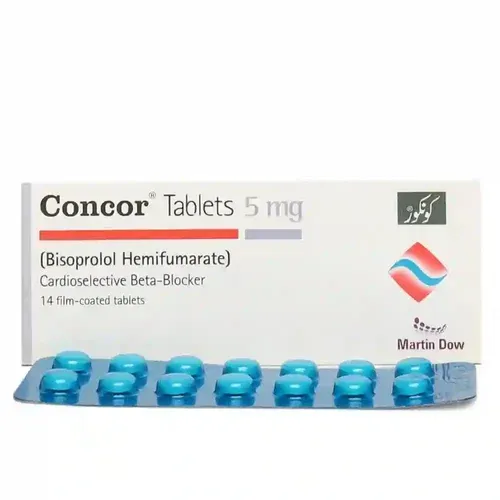Comprehensive Guide to Bisoprolol: Uses, Dosage, Side Effects, and More
What is Bisoprolol?
Overview of Bisoprolol
Generic Name: Bisoprolol
Brand Name: Zebeta, Concor, generics
Drug Group: Beta-1 selective adrenergic blocker
Commonly Used For
- Treat hypertension to lower blood pressure and reduce stroke risk.
- Manage chronic heart failure with reduced ejection fraction.
- Alleviate angina pectoris by decreasing myocardial oxygen demand.
- Off-label uses include migraine prophylaxis or tachycardia control under specialist guidance.
Key Characteristics
Form: Tablets (2.5 mg, 5 mg, 10 mg).
Mechanism: Selectively blocks beta-1 receptors in the heart, reducing chronotropic and inotropic effects.
Approval: FDA-approved (1992 for Zebeta) and EMA-approved for cardiovascular conditions.

Indications and Uses of Bisoprolol
Hypertension: Lowers elevated blood pressure in adults, reducing the risk of stroke, myocardial infarction, and kidney damage, with clinical trials (e.g., CIBIS-II) showing a 20% reduction in cardiovascular mortality over 1–2 years.
Chronic Heart Failure: Improves symptoms and survival in patients with stable mild to moderate heart failure (NYHA Class II–III) with reduced ejection fraction (<40%), often combined with ACE inhibitors and diuretics, supported by evidence of reduced hospitalization rates.
Angina Pectoris: Relieves chest pain due to coronary artery disease by decreasing heart rate and oxygen demand, with studies indicating a 15–25% reduction in angina episodes.
Off-Label Uses: Manages migraine prophylaxis in patients with cardiovascular comorbidities, controls inappropriate sinus tachycardia, or stabilizes heart rate in hyperthyroidism, guided by specialist protocols. Its use in migraine prevention has shown a 30–40% reduction in headache frequency in small cohorts, though larger studies are pending.
Dosage of Bisoprolol
Dosage for Adults
Hypertension:
- Initial: 2.5–5 mg once daily.
- Maintenance: 5–10 mg once daily, maximum 20 mg/day, titrated over 1–2 weeks based on blood pressure response.
Chronic Heart Failure:
- Initial: 1.25 mg once daily for 1 week (to assess tolerance).
- Week 2: 2.5 mg once daily.
- Week 3–8: 3.75–5 mg once daily.
- Maintenance: 5–10 mg once daily, maximum 10 mg/day, adjusted every 2 weeks with clinical evaluation.
Angina Pectoris:
- Initial: 2.5–5 mg once daily.
- Maintenance: 5–10 mg once daily, maximum 20 mg/day, titrated based on symptom relief.
Dosage for Elderly
Start with 2.5 mg once daily; increase to 5 mg after 1 week if tolerated, with a maximum of 10 mg/day due to age-related renal decline and sensitivity.
Dosage for Children
Not typically recommended; use only under pediatric cardiology guidance, starting at 0.1–0.2 mg/kg/day, maximum 10 mg/day, with careful monitoring.
Dosage for Pregnant Women
Dosage Adjustments
Renal Impairment:
- CrCl 20–40 mL/min: No adjustment, but monitor closely.
- CrCl <20 mL/min: Reduce to 2.5 mg/day; avoid in dialysis patients.
Hepatic Impairment:
- Mild (Child-Pugh A): No adjustment, but monitor.
- Moderate (Child-Pugh B): Limit to 5 mg/day.
- Severe (Child-Pugh C): Avoid or use 2.5 mg/day with caution.
Heart Failure: Initiate at 1.25 mg/day; double dose every 2 weeks if tolerated, up to 10 mg/day, with regular assessment of ejection fraction and symptoms.
Diabetes: Monitor blood glucose, as this drug may mask hypoglycemia symptoms.
Additional Considerations
- Take this active ingredient in the morning with or without food to maintain consistent levels.
- Avoid abrupt cessation; taper over 1–2 weeks to prevent rebound tachycardia or hypertension.
- Monitor heart rate (target >50 bpm) and blood pressure weekly during titration.
How to Use Bisoprolol
Administration: Swallow tablets whole with water, with or without food.
Timing: Dose once daily, preferably in the morning, to align with circadian blood pressure patterns.
Monitoring: Watch for bradycardia, dizziness, or shortness of breath.
Additional Tips:
- Check pulse before each dose; consult a doctor if below 50 bpm.
- Report severe fatigue or swelling immediately.
Contraindications for Bisoprolol
This drug is contraindicated in:
Patients with hypersensitivity to Bisoprolol or other beta-blockers.
Patients with severe bradycardia (heart rate <50 bpm) or second-/third-degree heart block without a pacemaker.
Patients with cardiogenic shock or decompensated heart failure requiring inotropic support.
Patients with sick sinus syndrome or severe peripheral arterial disease (e.g., Raynaud’s) unless benefits outweigh risks.
Patients with acute asthma or chronic obstructive pulmonary disease (COPD) with reversible airway obstruction, due to bronchospasm risk.
Patients with uncontrolled diabetes with frequent hypoglycemia, as this drug masks symptoms.
Patients with pheochromocytoma unless alpha-blockade is established.
Warnings & Precautions for Bisoprolol
General Warnings
Bradycardia: Risk of excessive heart rate reduction; monitor pulse regularly.
Heart Failure Worsening: May exacerbate symptoms in unstable patients; initiate at low doses.
Bronchospasm: Potential in patients with reactive airway disease; use with caution.
Hypotension: May cause dizziness or syncope; monitor blood pressure.
Masking Hypoglycemia: Hides symptoms in diabetic patients; frequent glucose checks needed.
Use in Specific Populations
Pregnancy: Category C; potential fetal bradycardia or growth restriction; use only if necessary.
Breastfeeding: Excreted in breast milk; use with caution and monitor infant.
Elderly: Increased risk of hypotension and bradycardia; start with 2.5 mg/day.
Children: Limited data; use only under specialist supervision.
Renal/Hepatic Impairment: Adjust dose in severe cases; monitor liver and kidney function.
Additional Precautions
- Inform your doctor about asthma, diabetes, or heart conditions before starting this medication.
- Avoid abrupt withdrawal, which may trigger angina or myocardial infarction.
Overdose and Management of Bisoprolol
Overdose Symptoms
- Severe bradycardia or asystole.
- Hypotension or shock.
- Bronchospasm or respiratory distress.
- Hypoglycemia or seizures in susceptible patients.
Immediate Actions
Contact Emergency Services: Seek immediate medical help.
Supportive Care: Administer atropine for bradycardia, glucagon or beta-agonists (e.g., isoproterenol) for heart failure, and ventilatory support if needed.
Monitor: Check ECG, blood pressure, and glucose levels for 12–24 hours.
Additional Notes
- Overdose risk is higher in renal impairment; store securely.
- Report persistent symptoms (e.g., confusion) promptly.
Side Effects of Bisoprolol
Common Side Effects
- Fatigue (15–25%, related to reduced cardiac output)
- Dizziness (10–20%, due to hypotension)
- Bradycardia (5–15%, dose-dependent)
- Cold extremities (5–10%, from peripheral vasoconstriction)
- Headache (5–8%, temporary)
These effects may decrease with dose adjustment or time.
Serious Side Effects
Cardiac: Severe bradycardia, chest pain, or heart failure symptoms.
Respiratory: Wheezing or shortness of breath (bronchospasm).
Neurological: Fainting or confusion (hypotension).
Metabolic: Hypoglycemia symptoms (sweating, shakiness) in diabetics.
Additional Notes
- Regular monitoring for heart rate, blood pressure, and glucose is essential.
- Report any unusual symptoms (e.g., swelling) immediately.
Drug Interactions with Bisoprolol
This active ingredient may interact with:
Calcium Channel Blockers (e.g., Verapamil): Enhanced bradycardia; monitor closely.
Antiarrhythmics (e.g., Amiodarone): Increased AV block risk; avoid combination.
NSAIDs: Reduced antihypertensive effect; use cautiously.
Insulin/Diabetes Medications: Masked hypoglycemia; adjust dose if needed.
Patient Education or Lifestyle
Medication Adherence: Take this beta-blocker as prescribed for hypertension or heart failure, adhering to the schedule to maintain efficacy.
Monitoring: Report bradycardia, dizziness, or breathing difficulties immediately.
Lifestyle: Avoid sudden position changes to prevent falls; engage in light exercise as tolerated.
Diet: No specific restrictions; maintain a low-sodium diet for hypertension.
Emergency Awareness: Know signs of heart failure or overdose; seek care if present.
Follow-Up: Schedule regular check-ups to assess heart rate, blood pressure, and renal function.
Pharmacokinetics of Bisoprolol
Absorption: Well-absorbed orally (90% bioavailability); peak plasma concentration at 1–4 hours.
Distribution: Volume of distribution ~3.5 L/kg; 30% protein-bound.
Metabolism: Hepatic via CYP3A4 and CYP2D6 to inactive metabolites; minimal first-pass effect.
Excretion: Primarily renal (50% unchanged); half-life 9–12 hours.
Half-Life: 9–12 hours, with steady-state reached in 5 days.
Pharmacodynamics of Bisoprolol
- Selectively blocking beta-1 receptors, reducing heart rate and contractility.
- Lowering blood pressure and myocardial oxygen demand in hypertension and angina.
- Improving left ventricular function in heart failure via reduced preload and afterload.
- Demonstrating dose-dependent efficacy, with optimal effects at 5–10 mg/day.
Storage of Bisoprolol
Temperature: Store at 20–25°C (68–77°F); protect from moisture.
Protection: Keep in original container, away from light.
Safety: Store out of reach of children.
Disposal: Dispose of unused tablets per local regulations or consult a pharmacist.
Frequently Asked Questions (FAQs)
Q: What does Bisoprolol treat?
A: This medication treats hypertension, heart failure, and angina.
Q: Can this active ingredient cause fatigue?
A: Yes, fatigue is common; report severe tiredness immediately.
Q: Is Bisoprolol safe for the elderly?
A: Yes, with dose adjustment; consult a doctor.
Q: How is this drug taken?
A: Orally as tablets, once daily, as directed.
Q: How long is Bisoprolol treatment?
A: Long-term for chronic conditions, with periodic reassessment.
Q: Can I stop Bisoprolol suddenly?
A: No, taper under medical supervision to avoid rebound effects.
Regulatory Information
This medication is approved by:
U.S. Food and Drug Administration (FDA): Approved in 1992 (Zebeta) for hypertension.
European Medicines Agency (EMA): Approved for hypertension, heart failure, and angina.
Other Agencies: Approved globally for cardiovascular uses; consult local guidelines.
References
- U.S. Food and Drug Administration (FDA). (2023). Zebeta (Bisoprolol) Prescribing Information.
- Official FDA documentation detailing the drug’s approved uses, dosage, and safety.
- European Medicines Agency (EMA). (2023). Bisoprolol Summary of Product Characteristics.
- EMA’s comprehensive information on the medication’s indications and precautions in Europe.
- National Institutes of Health (NIH). (2023). Bisoprolol: MedlinePlus Drug Information.
- NIH resource providing detailed information on the drug’s uses, side effects, and precautions.
- World Health Organization (WHO). (2023). WHO Model List of Essential Medicines: Bisoprolol.
- WHO’s inclusion of Bisoprolol for cardiovascular conditions.
- European Heart Journal. (2021). Bisoprolol in Heart Failure.
- Peer-reviewed article on Bisoprolol efficacy (note: access may require a subscription).
